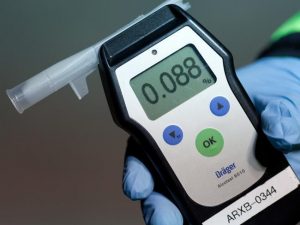When a driver is pulled over or stopped by law enforcement and asked to submit to a breathalyzer test, the driver has a right to refuse a breathalyzer test. Many drivers do not refuse to submit to a breathalyzer test either because they do not know that they can refuse, they are scared of the consequences, or they are too intoxicated at the time to exercise good judgement. The problem with submitting to the test is that under Massachusetts law, if a driver suspected of driving under the influence blows a blood alcohol content higher than 0.08, the driver is considered per se intoxicated and can be convicted of DUI on the breathalyzer results alone. Law enforcement do not advise suspected drunk drivers of the consequences of failing a breathalyzer test.
Effectively, a machine can render a conviction for driving under the influence in Massachusetts. This makes submitting to a breathalyzer test potentially incriminating, since the test results can be used as evidence against a suspect. Shouldn’t drivers be allowed to contact a DUI lawyer before deciding to submit to a breathalyzer test, when the consequences for either submitting or refusing the test are so high? Refusing the test could cost you your driver’s license, while submitting to the test could result in an OUI conviction. Being able to access legal advice before making a decision could help suspects make an informed decision about submitting to the breathalyzer test.
Mass. High Court Hears Breathalyzer Case
The Massachusetts Supreme Judicial Court recently heard arguments concerning this issue and are expected to render a decision on the matter in June. One side argued that drivers suspected of OUI should be permitted to contact a lawyer at the critical stage in the criminal process when they are asked to submit to a test, since suspected criminals have a right to counsel under the Sixth Amendment to the U.S. Constitution and under the Massachusetts Declaration of Rights.
The opposing position noted that an OUI conviction is not based solely on breathalyzer test results in a vacuum. Other elements of the crime of OUI must be proven, too, including that the driver was in fact operating the vehicle under the influence and that the vehicle was being operated on a public highway or road, and not on private property.
The justices were intrigued by the idea that suspected drunk drivers have the right to counsel prior to a breathalyzer, and asked many questions about how such a right would be implemented. If a driver is pulled over and asked to submit to a breathalyzer test roadside, how would the suspect contact the lawyer? What if it is the middle of the night and the lawyer cannot be reached? What if the suspect cannot afford a lawyer? Would the state appoint one on the suspect’s behalf?
Contacting a Massachusetts OUI Criminal Defense Attorney
While the issue of whether suspected drunk drivers have a right to a lawyer prior to deciding to submit to a breathalyzer test is still a question to be decided by the state high court, those who are facing OUI charges need to get in touch with an experienced OUI criminal defense lawyer now. Our Attorney can assist you in developing a OUI criminal defense strategy that is right for your particular circumstances. Please do not hesitate to contact OUI defense Our Attorney
 Massachusetts Criminal Defense Attorney Blog
Massachusetts Criminal Defense Attorney Blog


